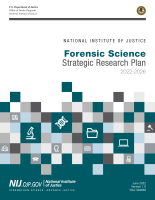Standards
Autoloading Pistols for Police Officers: NIJ Standard-0112.03
National Institute of Justice Forensic Science Strategic Research Plan, 2022-2026 (Version 1.1)
Prize Reinforcement Contingency Management for Treating Cocaine Users: How Low Can We Go, and With Whom?
Development of tailor-made inorganic gunshot residue (IGSR) microparticle standards and characterization with a multi-technique approach
Evaluation of an internal standard for qualitative DART-MS analysis of seized drugs
Office of Law Enforcement Standards
Determination of seventeen major and trace elements in new float glass standards for use in forensic comparisons using laser ablation inductively coupled plasma mass spectrometry
Long-Term Impact and Cost-Effectiveness of Risk-Needs Assessment and Risk-Need-Responsivity (RNR) Reforms in Juvenile Probation: The Long-Term RNR-Impact Study
Establishing Sufficiency Thresholds for Assessing the Quality of Mass Spectral Data
Analysis of primer gunshot residue particles by laser induced breakdown spectroscopy and laser ablation inductively coupled plasma mass spectrometry
Secretariat for ISO/IEC JTC 1/SC 37, Biometrics
Application of the OSAC Registry of Standards to Forensic Science Service Providers' Quality Systems
12-Gauge Shotguns for Police Use, NIJ Standard-0113.00
NIJ Compliance Testing for Autoloading Pistols
NIJ administers the NIJ Compliance Testing Program (NIJ CTP) to determine a specific pistol model’s compliance with NIJ Standard 0112.03, Autoloading Pistols for Police Officers, Revision A. The NIJ CTP helps ensure the pistols purchased and used by law enforcement agencies will perform as expected.
About the Standard
NIJ Standard...
Development of Modern Subadult Standards: Improved Age and Sex Estimation in U.S. Forensic Practice
Alternatives to Traditional School Discipline - Breakout Session, NIJ Virtual Conference on School Safety
On February 16-18, 2021, the National Institute of Justice hosted the Virtual Conference on School Safety: Bridging Research to Practice to Safeguard Our Schools. This video includes the following presentations:
See the YouTube Terms of Service and Google Privacy Policy
Overcoming School Safety Intervention Implementation Challenges - Breakout Session, NIJ Virtual Conference on School Safety
On February 16-18, 2021, the National Institute of Justice hosted the Virtual Conference on School Safety: Bridging Research to Practice to Safeguard Our Schools. This video includes the following presentations:
See the YouTube Terms of Service and Google Privacy Policy
A Metrology Foundation for 3D Ballistics Imaging
Expanding Research to Examine the Impacts of Forensic Science on the Criminal Justice System
In 2004, the National Institute of Justice created the social science research on forensic sciences (SSRFS) research program to explore the impact of forensic sciences on the criminal justice system and the administration of justice. Much of the early research from the SSRFS program focused on DNA processing and the use of DNA in investigations and prosecutions.
See the YouTube Terms of Service and Google Privacy Policy




